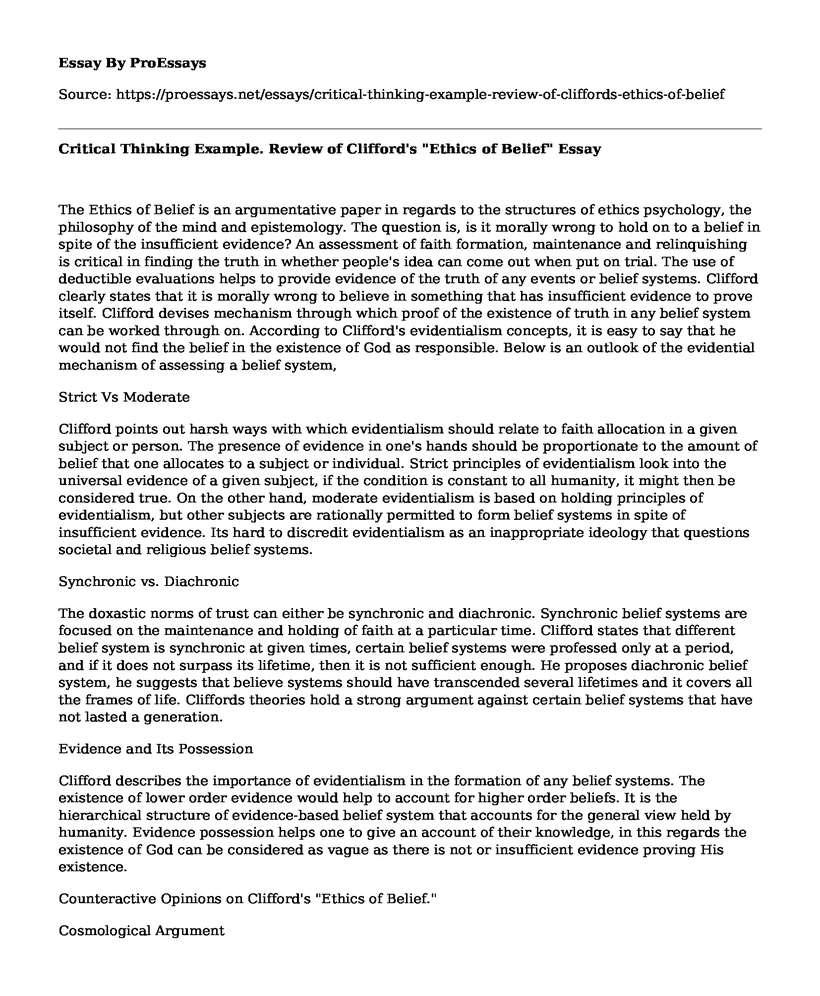The Ethics of Belief is an argumentative paper in regards to the structures of ethics psychology, the philosophy of the mind and epistemology. The question is, is it morally wrong to hold on to a belief in spite of the insufficient evidence? An assessment of faith formation, maintenance and relinquishing is critical in finding the truth in whether people's idea can come out when put on trial. The use of deductible evaluations helps to provide evidence of the truth of any events or belief systems. Clifford clearly states that it is morally wrong to believe in something that has insufficient evidence to prove itself. Clifford devises mechanism through which proof of the existence of truth in any belief system can be worked through on. According to Clifford's evidentialism concepts, it is easy to say that he would not find the belief in the existence of God as responsible. Below is an outlook of the evidential mechanism of assessing a belief system,
Strict Vs Moderate
Clifford points out harsh ways with which evidentialism should relate to faith allocation in a given subject or person. The presence of evidence in one's hands should be proportionate to the amount of belief that one allocates to a subject or individual. Strict principles of evidentialism look into the universal evidence of a given subject, if the condition is constant to all humanity, it might then be considered true. On the other hand, moderate evidentialism is based on holding principles of evidentialism, but other subjects are rationally permitted to form belief systems in spite of insufficient evidence. Its hard to discredit evidentialism as an inappropriate ideology that questions societal and religious belief systems.
Synchronic vs. Diachronic
The doxastic norms of trust can either be synchronic and diachronic. Synchronic belief systems are focused on the maintenance and holding of faith at a particular time. Clifford states that different belief system is synchronic at given times, certain belief systems were professed only at a period, and if it does not surpass its lifetime, then it is not sufficient enough. He proposes diachronic belief system, he suggests that believe systems should have transcended several lifetimes and it covers all the frames of life. Cliffords theories hold a strong argument against certain belief systems that have not lasted a generation.
Evidence and Its Possession
Clifford describes the importance of evidentialism in the formation of any belief systems. The existence of lower order evidence would help to account for higher order beliefs. It is the hierarchical structure of evidence-based belief system that accounts for the general view held by humanity. Evidence possession helps one to give an account of their knowledge, in this regards the existence of God can be considered as vague as there is not or insufficient evidence proving His existence.
Counteractive Opinions on Clifford's "Ethics of Belief."
Cosmological Argument
This belief system proves the existence of God through the life of the universe. The universe is what it is based on the design of a higher power. The fact is that the perfection and balance in the ecological conditions of the earth to support life indicates evidence of a highly detailed design. God is the creator of the universe, and this is the simplest explanation for the existence of different life forms and nature is sufficient evidence. Any other arguments will be considered illogical as God's works are seen in the world in the most visible way.
Cite this page
Critical Thinking Example. Review of Clifford's "Ethics of Belief". (2021, Apr 06). Retrieved from https://proessays.net/essays/critical-thinking-example-review-of-cliffords-ethics-of-belief
If you are the original author of this essay and no longer wish to have it published on the ProEssays website, please click below to request its removal:
- Essay Sample on Ethical Issues in the U.S Correctional Systems
- Forgiveness Is Important as It Is a Way of Getting Support From God - Paper Example
- Essay Sample on Literary Relationships Between the Gospel of John and the Synoptic Gospels
- 21st Century Challenges to Christian Growth - Essay Sample
- Essay Sample on Interview with Mr. Xyz: A Catholic Christian Working for American Defense Forces
- God vs. Satan: The Battle of Job in the Bible - Essay Sample
- Essay Exampe on Hindu & Buddhist Festivals: Expressing Cultural Beliefs







